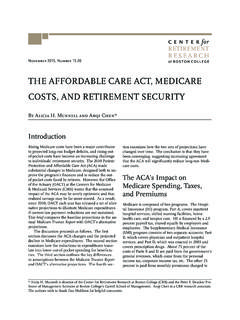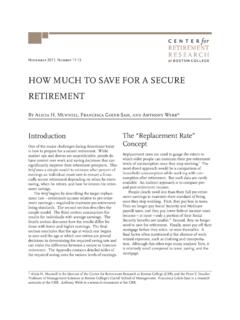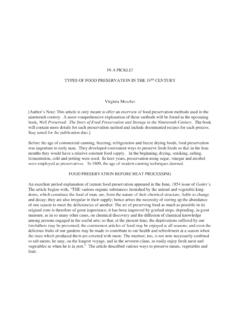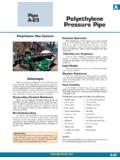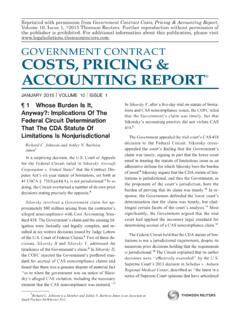Transcription of COGNITIVE AGING AND THE CAPACITY TO MANAGE …
1 RETIREMENT. RESEARCH. January 2017, Number 17-1. COGNITIVE AGING AND THE CAPACITY TO. MANAGE money . By Anek Belbase and Geoffrey T. Sanzenbacher*. Introduction While Americans often worry about not having tive AGING on financial CAPACITY . The third section enough money in retirement, they seldom worry explores the effects of COGNITIVE impairment on finan- about their CAPACITY to MANAGE that At first cial CAPACITY . The final section concludes that: 1) most glance, this lack of concern appears justified because people who experience normal COGNITIVE AGING can many financial activities are so routine like pay- continue managing their money in their 70s and 80s, ing the monthly bills on time.
2 Such activities draw but some, especially financial novices who take over on crystallized intelligence, which is accumulated money management after the death of a spouse, will knowledge that increases with age. But normal need help; 2) most people with a COGNITIVE impair- COGNITIVE AGING can lead to financial mistakes because ment will need help managing their money to prevent people lose much of their fluid intelligence the fraud or abuse; and 3) providing this assistance effec- CAPACITY to process new information by the time tively will require overcoming several obstacles. they reach their 70s or 80s. And a minority develop a COGNITIVE impairment that severely erodes financial CAPACITY .
3 How COGNITIVE AGING Could This brief, the third in a series of three, reviews the literature to assess how COGNITIVE AGING affects the Affect Financial CAPACITY CAPACITY to MANAGE money during ages 70-90. The Financial CAPACITY is the ability to MANAGE financial first brief provided a primer on COGNITIVE AGING , and affairs in one's own best interest, and involves a range the second brief assessed its effects on the ability to of activities from carrying out procedures, such as work during ages 50-70. bill paying, to exercising judgment, such as assessing The discussion proceeds as follows. The first an investment's potential return relative to its section explains how COGNITIVE AGING could potentially Table 1 on the next page shows the types of abilities affect the ability to MANAGE personal finances.
4 The assessed by a popular measure of financial CAPACITY . second section examines the impact of normal cogni- * Anek Belbase is a research fellow at the Center for Retirement Research at Boston College (CRR). Geoffrey T. Sanzen- bacher is a research economist at the CRR. 2 Center for Retirement Research Table 1. Types of Abilities Measured by Tests of Financial CAPACITY and Financial CAPACITY Normal COGNITIVE AGING Type of ability Example of tasks Normal COGNITIVE AGING generally does not affect Basic money skills Identify and understand relative financial CAPACITY enough to warrant intervention. value of bills and coins. While studies suggest that some people over 70 who Cash transactions Assess cost of an item and are not cognitively impaired might make more mis- understand sales receipt.
5 Takes due to declining judgment, the consequences of Checkbook management Know when/how to use a check. these mistakes appear to be relatively Bill payment Understand how to read, pay, Retirees in their 70s and 80s are often just as able and dispute bills. to pay the bills, handle debt, and maintain good credit as workers in their 50s and 60s. For example, one Bank statement Find deposits, withdrawals, and study that directly measured financial capability using management balances in a bank statement. a standardized test found that 95 percent of adults Asset and estate Identify assets and income. without COGNITIVE impairment were fully able to man- management age their own And the evidence suggests Knowledge of financial Understand concepts like debt, that accumulated knowledge explains how people concepts insurance, and asset returns.
6 Handle money effectively despite decreased fluid abil- Financial judgment Assess what an asset is worth, ity. For example, a study of adults ages 18-86 found detect fraud and other risks. that, for each decade lived, credit scores increased by an average of 13 points, controlling for factors like in- Source: Adapted from Marson et al. (2009). come and This study also found evidence that financial knowledge, which does not decline with age, explained the resiliency in Researchers use two main types of tests to assess The flip side of the role of knowledge in preserv- financial CAPACITY : 1) performance-based assessments ing financial capability is that those without such of common tasks like reading an electric bill and knowledge are vulnerable.
7 These financial novices writing and sending in the check; and 2) clinical are typically individuals who take over the responsi- assessments, which include both an interview and bility of managing their household's finances after a COGNITIVE tests to assess an individual's CAPACITY to spouse dies or becomes incapacitated. They are likely make sound Both types of tests are typi- to need help with all aspects of financial management cally performed in-person, require 30-60 minutes, and from paying bills on time to updating a will until can gauge whether a person is capable of managing they have gained enough knowledge. Unfortunately, his finances independently, needs help on some tasks, the learning curve will be challenging for them due or is incapable of controlling his to normal COGNITIVE AGING , which diminishes the Financial CAPACITY relies on two key abilities: 1) CAPACITY to assimilate new If people in performing financial tasks, which mostly requires these situations lack the support they need, they could crystallized intelligence, or knowledge.
8 And 2) making make mistakes, with consequences ranging in sever- financial judgments, which requires a mix of knowl- ity from lower credit scores to prematurely running edge and fluid intelligence like memory, attention, out of money . and information processing. Knowledge remains These financial novices are clearly noticeable in largely intact into one's 70s and 80s for those experi- longitudinal studies, which have found that a number encing normal COGNITIVE AGING , but fluid ability starts of individuals in their 70s and 80s switched to becom- to decline as early as one's This pattern means ing a financial respondent for the household for the that individuals experiencing normal AGING are more first time, which means that they likely assumed likely to develop deficits in their financial judgment responsibility for financial The people who than in their ability to carry out financial tasks.
9 But took on this role are predominantly those who lost a how seriously does this decline in fluid ability affect spouse and over two-thirds are women. financial CAPACITY ? Issue in Brief 3. Individuals who inherit financial responsibili- As noted above, a recent study assessing financial ties will need varying degrees of assistance: a person CAPACITY among the elderly found that 95 percent of with some relevant knowledge might need informal participants without any impairment were capable of help from a family member, while someone with no independently managing their finances. In contrast, financial knowledge might need more formal as- this proportion drops to 82 percent of adults with sistance.
10 Unlike people with COGNITIVE impairment, MCI and just 20 percent of adults with dementia (see most financial novices with preserved COGNITIVE abili- Figure 2).13 While participants with dementia experi- ties will eventually gain enough knowledge to handle enced widespread losses in financial CAPACITY overall, most financial matters without help. those in the early stages of the disease struggled to perform tasks requiring financial judgment, while those in the late stages had trouble even with tasks Financial CAPACITY and requiring only procedural COGNITIVE Impairment Unlike the normal COGNITIVE changes associated Figure 2. Percentage of Adults Capable of with AGING , COGNITIVE impairment, which is increas- Managing Their Finances, by Impairment Status ingly likely for those in their 80s, can rapidly erode financial CAPACITY .
